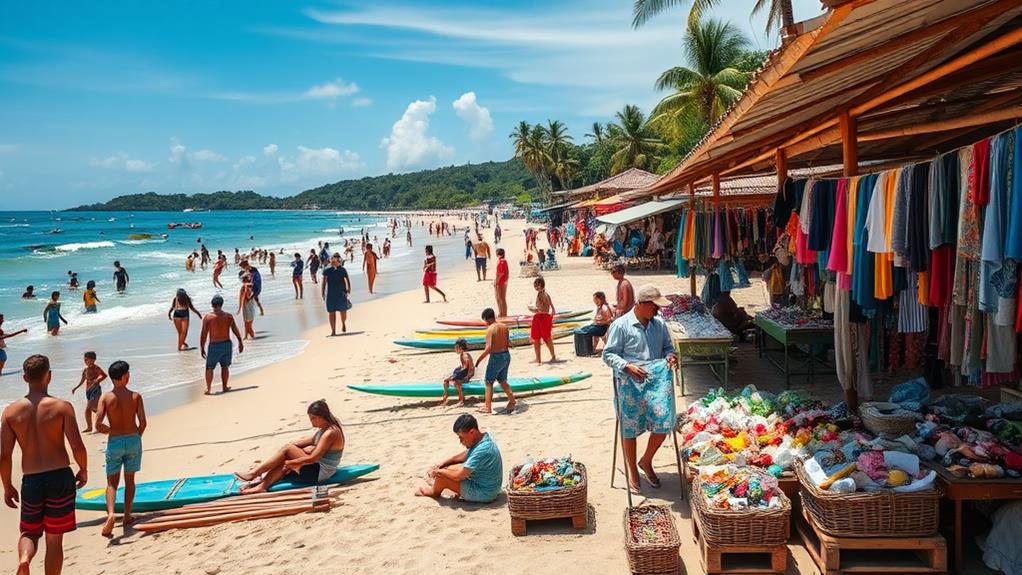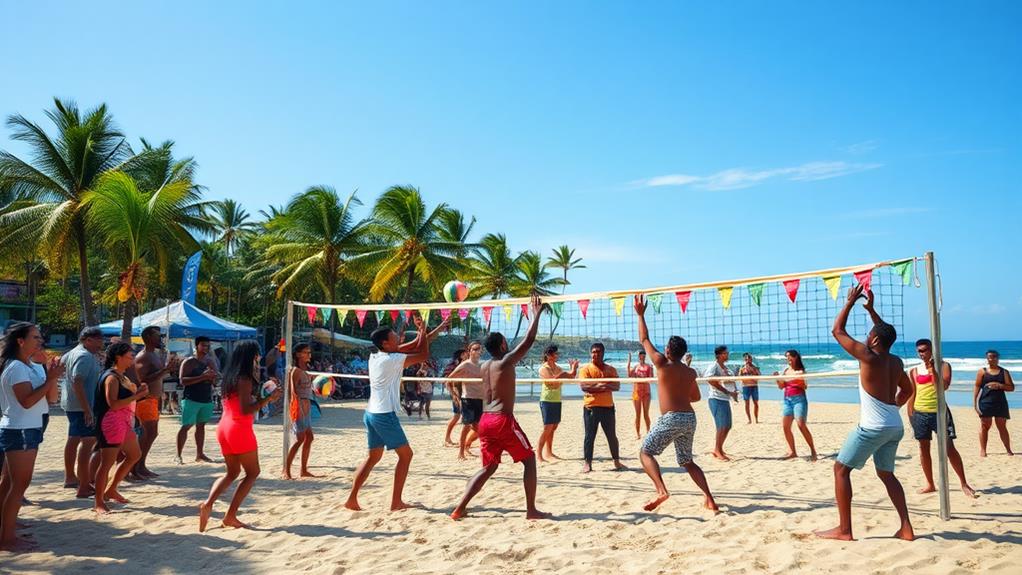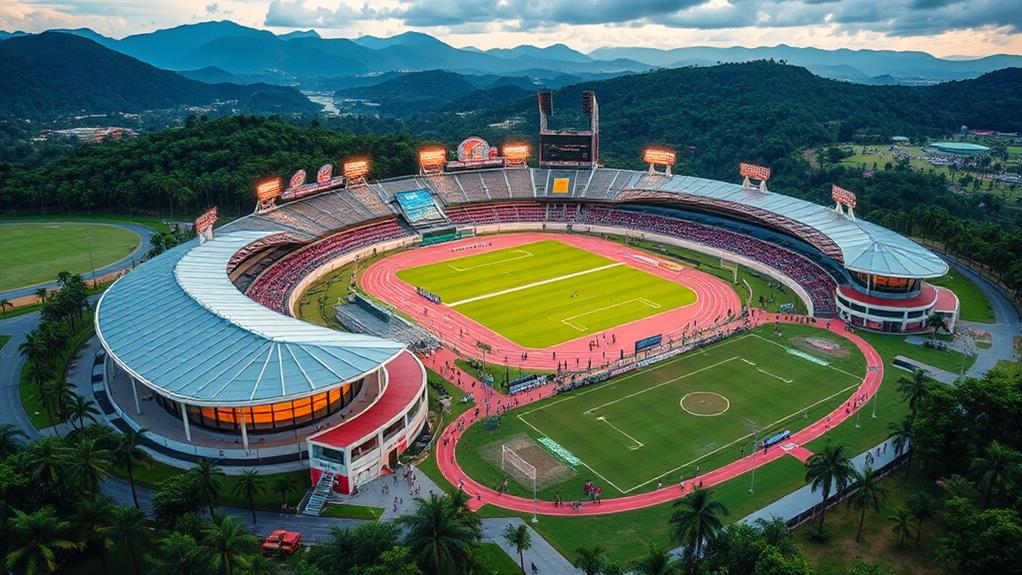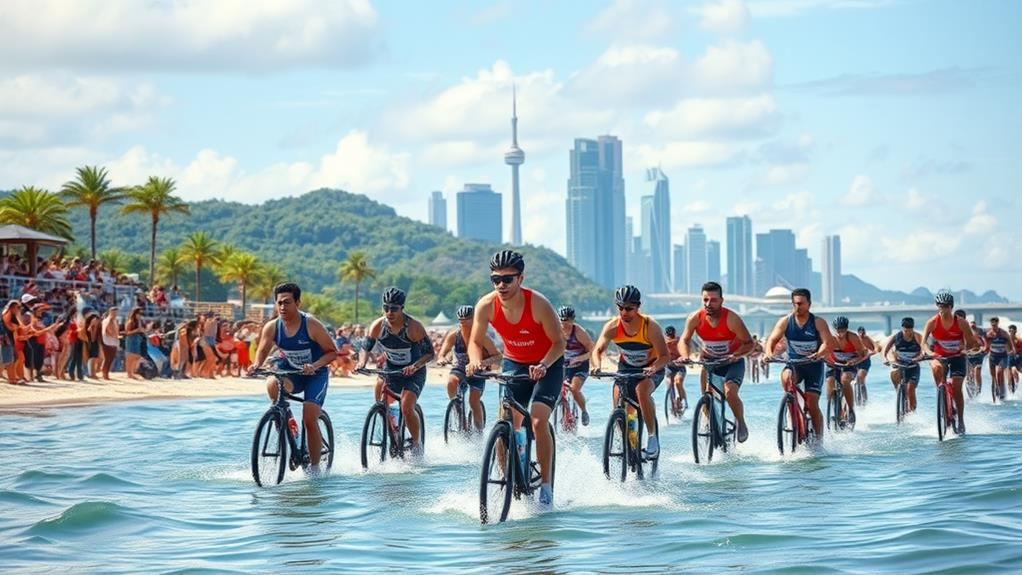Sports tourism in the Philippines is a growing industry that attracts international visitors and contributes significantly to the country's economy. The country's reputation as a premier sports destination is enhanced by hosting major events like the Southeast Asian Games (SEA Games) and the FIBA World Cup. These events not only generate revenue for local businesses but also create jobs and foster community pride.
Investments in sports infrastructure have improved facilities, making it easier to host international competitions. For example, the Philippine Arena, a state-of-the-art sports venue, has hosted several international events, including the 2019 SEA Games.
Furthermore, a focus on sustainable practices ensures minimal environmental impact, making sports tourism a more responsible and eco-friendly sector.
This dynamic sector continues to evolve, offering exciting opportunities for growth and community engagement. The development of new sports facilities and the hosting of more international events are expected to create more jobs and stimulate local economies.
As the sports tourism industry in the Philippines grows, it is likely to have a positive impact on the country's economy and communities.
Definition of Sports Tourism

Sports tourism is a unique experience that combines travel with sporting events, generating significant economic impact and promoting community engagement.
When people travel to participate in or watch sporting events, they create a boost in local economies. For instance, attending major events like the SEA Games or the FIBA World Cup increases spending on accommodations, food, and entertainment.
In 2021, sports tourism generated over $90 billion in the U.S. alone, and approximately $600 billion globally.
Positioning a destination as a sports tourism hub, like the Philippines in Asia, attracts international visitors and showcases its culture and hospitality through diverse sporting events.
This not only generates revenue but also promotes physical activity among visitors, encouraging a healthier lifestyle. Local participation in events fosters community engagement, generating pride and unity among citizens.
By understanding the definition of sports tourism, it's clear that it plays a dual role as a catalyst for economic growth and a promoter of community spirit.
Current Trends in Sports Tourism
The Philippines is emerging as a premier sports tourism destination. The country's successful hosting of prominent international sports events, such as the Southeast Asian Games and the FIBA World Cup, has significantly boosted tourist numbers and showcased its capabilities on the global stage.
Infrastructure improvements and partnerships are key to the country's success. Local governments are actively engaging in infrastructure development and forming partnerships with the Philippine Sports Commission to enhance accessibility and community involvement in sports events. This proactive approach not only elevates the experience for visitors but also fosters a sense of pride among locals.
The Philippine Sports Tourism Awards promotes excellence in the sector. The awards recognize over 50 enterprises and host cities for their excellence, promoting professionalism within the sector.
This focus on sports tourism as a vital contributor to the overall tourism industry emphasizes its potential for economic impact.
Sports tourism is driving sustainable growth in the Philippines' tourism landscape. By showcasing local culture and hospitality through sporting events, the country isn't just attracting visitors; it's paving the way for sustainable growth.
In 2024, the Philippines will host 17 IRONMAN races, attracting thousands of participants and fans, further solidifying its status as a sports tourism hub.
Economic Impact on Local Communities

Sports tourism has a profound economic impact on local communities in the Philippines. It attracts thousands of visitors, generating substantial spending in host cities and benefiting local businesses, including restaurants and hotels.
Infrastructure investments are crucial for hosting sports events. Local governments invest in improving sports facilities, such as baseball diamonds and football pitches, to enhance their capacity to host events. This not only fosters growth but also engages local residents in meaningful ways.
Sports tourism creates jobs and stimulates local economies. The youth sports sector alone contributes over 635,000 jobs and brings in an estimated $12.9 billion in tax revenue.
The recognition of locations like Clark Freeport Zone through the Philippine Sports Tourism Awards highlights the direct impact of sports tourism on job creation.
The economic benefits of sports tourism are sustainable and long-lasting. By creating jobs and stimulating local businesses, sports tourism lays the groundwork for sustainable growth and development.
Embracing this potential can lead to a flourishing sports tourism landscape, benefiting everyone involved.
Key Sports Events in the Philippines
The Philippines is a thriving sports tourism destination, largely shaped by various key sporting events that attract athletes and spectators from around the world.
The SEA Games and FIBA World Cup have significantly boosted tourist arrivals, showcasing the nation as a competitive sports destination. These events create a vibrant atmosphere that enhances the local economy while promoting national pride.
In 2024, the Philippines will host over 17 IRONMAN races, bringing together thousands of local and international athletes and solidifying its reputation in the sports tourism sector.
The Philippine Sports Tourism Awards recognize over 50 enterprises and host cities for their contributions to this growing industry.
Events like the Panagbenga Festival in Baguio City combine local culture with sports, enhancing the tourism experience and driving economic growth through sports-related activities.
By positioning itself as an Asian hub for triathlon events, the Philippines capitalizes on its stunning natural landscapes and rich sports culture, attracting global participants and reinforcing its status within the international sports tourism arena.
Community Engagement Through Sports

Community Engagement Through Sports
Sports have become a vital force for community development and pride in the Philippines, fostering connections among locals while enhancing tourism. Hosting significant sports events, such as the SEA Games and the FIBA World Cup, attracts visitors and invigorates local communities.
Youth Involvement is a key aspect of community engagement through sports. Public sporting facilities encourage young people to participate in various sports, such as basketball and volleyball. For example, the Dumaguete City government, under Mayor Felipe A. Remollo, has developed sports facilities that provide opportunities for local youth to engage in sports activities.
Community engagement through sports also provides an Economic Boost. Hosting events generates revenue for local businesses and creates jobs. For instance, the 2019 SEA Games generated an estimated PHP 10 billion in revenue for the Philippines.
Infrastructure Development is another benefit of community engagement through sports. Improved facilities enhance the overall quality of life in communities. The Philippine government has invested in building modern sports facilities, such as the Philippine Sports Stadium, to host international events.
Community engagement through sports also promotes Skill Development. Local youth can hone their athletic skills, fostering future champions. The Philippine Sports Commission provides training programs for young athletes, helping them to develop their skills and compete at the international level.
Finally, community engagement through sports brings Recognition to local initiatives. Awards like the Philippine Sports Tourism Awards highlight successful local initiatives, encouraging other communities to follow their example.
Through these efforts, community engagement through sports cultivates a sense of belonging and lays the groundwork for sustainable tourism, making sports a cornerstone of local identity and pride.
Sustainable Practices in Sports Tourism
Sustainable Practices in Sports Tourism
Environmental Sustainability
Incorporating sustainable practices into sports tourism safeguards the environment for future generations. Eco-friendly venues reduce waste and resource use, enhancing the visitor experience while minimizing environmental impact.
For instance, using energy-efficient lighting and recycling programs in stadiums reduces carbon emissions and conserves natural resources.
Cultural Preservation and Community Involvement
Engaging local communities in sports tourism initiatives fosters cultural preservation and offers opportunities for community involvement, enriching the overall experience for visitors.
Community engagement initiatives provide authentic cultural experiences, allowing visitors to immerse themselves in local traditions. This can be achieved through partnerships with local organizations, supporting community-led initiatives, and promoting local artisans.
Conservation and Partnerships
Partnerships with conservation organizations protect biodiversity and ecosystems, offering unique, eco-conscious tourism activities.
These collaborations promote responsible tourism practices, ensuring the preservation of natural habitats and ecosystems. For example, partnering with conservation groups to develop eco-friendly trails or wildlife watching tours supports conservation efforts while providing visitors with unique experiences.
Wellness Tourism and Economic Benefits
The emphasis on wellness tourism within sports events promotes healthy lifestyles while minimizing carbon footprints associated with travel.
Strategic planning that focuses on sustainability maximizes long-term economic benefits for local communities, aligning with multiple Sustainable Development Goals (SDGs).
Infrastructure Development for Sports

Investing in sports infrastructure is crucial for the Philippines to become a premier destination for sports tourism. The government's commitment to infrastructure development has led to significant enhancements in local facilities, largely funded by resources like the Hotel Occupancy Tax.
Enhanced facilities accommodate various sports events and foster community engagement. For instance, the construction of baseball diamonds and football pitches in Clark has provided a platform for both local and international teams to train and compete.
Moreover, the collaboration between the Department of Tourism and local governments ensures that these facilities meet international standards.
Hosting major events attracts tourists and supports local businesses. The Philippines has successfully hosted major events like the SEA Games and FIBA World Cup, drawing in tourists and generating revenue for local businesses.
Facilities like the Clark Freeport Zone have become popular attractions, further boosting the local economy. By supporting local businesses during sports events, the government promotes sustainable economic growth.
Opportunities for Investment
Investment Opportunities in Sports Tourism
The Philippines offers a lucrative landscape for investment in sports tourism, driven by the government's proactive approach to infrastructure development and event promotion.
Government Support and Funding Mechanisms
The government provides funding mechanisms such as the Hotel Occupancy Tax and municipal bonds to support the development of sports facilities.
These investments not only enhance local sports infrastructure but also attract major events that drive significant tourism.
Incentives for Excellence
The Philippine Sports Tourism Awards (PSTA) incentivize excellence in the sector, encouraging innovative projects that elevate the country's profile in the global sports arena.
Successful initiatives like the SEA Games and IRONMAN races have demonstrated a direct correlation between sports tourism and increased local spending.
Regional Growth and Community Engagement
Regions like Clark are experiencing improvements in facilities such as baseball diamonds and football pitches, expanding opportunities for community engagement and economic growth.
With the government's support and growing interest in sports tourism, now is the perfect time to explore investment opportunities that can benefit both investors and the overall economic landscape of the Philippines.
Future of Sports Tourism in the Philippines

The Philippines is poised for a thriving sports tourism industry. The government's commitment to promoting sports tourism as a strategy for economic growth will enhance the country's appeal to international visitors. Hosting prestigious events like the SEA Games and FIBA World Cup has already boosted tourist arrivals and elevated local economies.
Several factors will fuel the growth of sports tourism:
Investment in improved sports facilities will provide world-class infrastructure for international events. For instance, the country will host multiple IRONMAN races and regional events in 2024, attracting top athletes and spectators.
Recognition through the Philippine Sports Tourism Awards will acknowledge excellence in sports tourism, encouraging innovation and improvement.
Enhanced infrastructure supporting community engagement will foster a culture of sports participation and appreciation.
Focused marketing strategies targeting international athletes and tourists will promote the Philippines as a premier sports tourism destination.
These developments won't only showcase the nation's sporting potential but also create substantial economic impact, benefiting local businesses and communities.
The future of sports tourism in the Philippines looks bright, promising increased visitor influx and long-term economic benefits for the country.
Questions and Answers
What Are the Benefits of Sports Tourism in Philippines?
Sports tourism in the Philippines combines adventure and cultural exchange, offering a unique travel experience. This blend of activities allows you to engage in thrilling sports like surfing and diving while immersing yourself in local traditions and festivals.
For instance, you can explore the annual Sinulog Festival in Cebu, which showcases the country's rich cultural heritage.
This experience fosters community connections and local pride. By participating in sports tourism, you contribute to the growth of local businesses, creating jobs and boosting infrastructure.
For example, the surfing industry in Siargao Island has generated employment opportunities for local residents and stimulated the construction of new accommodations and amenities.
Sports tourism also has significant economic benefits. The influx of visitors leads to increased revenue, which in turn, boosts the local economy.
In 2020, the Philippine sports tourism industry generated approximately PHP 24.2 billion (around USD 480 million) in revenue. By participating in sports tourism, you contribute to a vibrant economy while enjoying unforgettable adventures and cultural experiences.
How Tourism Contributes to the Economy in the Philippines?
Tourism stimulates economic growth in the Philippines by generating revenue and creating jobs. When tourists visit, they support local businesses, such as hotels, restaurants, and souvenir shops, which in turn create employment opportunities for Filipinos.
For instance, in 2020, the tourism industry employed around 5.7 million people, contributing to 13.5% of the country's total employment.
Infrastructure development is also driven by tourism. As tourist numbers increase, the government invests in building better roads, airports, and amenities to accommodate visitors. This infrastructure development not only enhances the tourist experience but also attracts investors and stimulates economic growth.
For example, the upgrade of the Clark International Airport has increased its capacity to handle more flights and passengers, making it easier for tourists to access popular destinations.
The growth of tourism creates a sustainable cycle. Improved infrastructure, such as better roads and amenities, further encourages tourism, which in turn generates more revenue and creates more jobs.
This cycle enriches the economy continuously, making tourism a vital contributor to the country's economic development.
What Is the Economic Impact of Sports Tourism?
Sports tourism has a significant impact on local economies.
It generates revenue through visitor spending on accommodations, dining, and local attractions. For instance, when a major sporting event comes to town, local hotels and restaurants experience a surge in bookings and sales. This increased revenue has a ripple effect, boosting revenue for local businesses and enhancing community engagement.
As visitor spending increases, jobs in hospitality and event management expand, leading to a healthier economy.
For example, when a region hosts a major tournament, it may need to hire additional staff to manage the event, from ticketing and security to concessions and transportation.
Improved infrastructure and facilities also become more appealing to potential visitors, ensuring sustained economic benefits.
How Do Sporting Events Boost the Local Economy?
Sporting events significantly boost the local economy. This is because they attract thousands of visitors who spend money on accommodations, meals, and entertainment. For instance, a major football championship can draw in over 50,000 spectators, resulting in a significant influx of cash for local hotels, restaurants, and entertainment venues.
This influx of cash supports local businesses and creates jobs, which has a lasting impact on the community.
Moreover, hosting major sporting events often leads to investments in improved infrastructure, such as upgraded stadiums, transportation systems, and communication networks.
These infrastructure improvements provide long-term benefits to the community, even after the event has concluded. For example, a city that hosts the Olympics may build a new state-of-the-art stadium, which can then be used for future events, attracting more visitors and generating additional revenue.